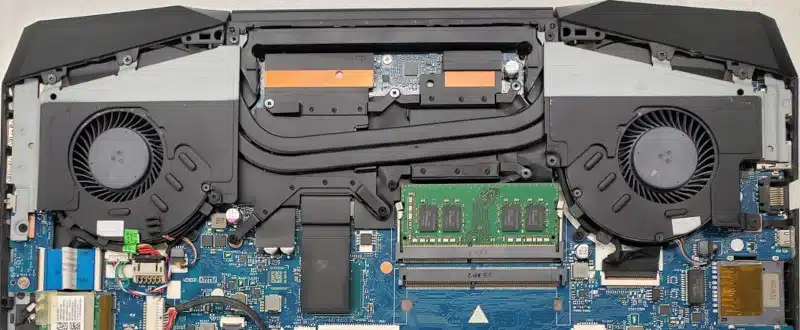Laptop fans play a crucial role in maintaining the temperature and performance of our beloved portable computers. However, it’s not uncommon for laptop fans to go bad over time, leading to potential overheating issues and decreased system efficiency. Understanding why laptop fans fail can help us take proactive steps to prevent such occurrences and ensure the longevity of our devices.
One of the primary reasons laptop fans may go bad is dust accumulation. Furthermore, over time, the fan intake vents tend to attract dust particles, which can hinder the smooth operation of the fan blades. Additionally, as dust builds up, it creates a barrier, obstructing the airflow and causing the fan to work harder. Consequently, this added strain can lead to premature fan failure.
Another significant factor contributing to fan failure is the accumulation of debris, such as pet hair, food particles, or lint. Consequently, these foreign objects can clog the fan and impede its rotation, leading to overheating and potential damage to internal components. Therefore, keeping laptops clean and debris-free is crucial to prevent such issues from arising.
Causes of Laptop Fan Failure
1. Insufficient maintenance and cleaning
Regular maintenance and cleaning are essential for the proper functioning of laptop fans. Whereas neglecting to clean the fan vents and internal components allows dust and debris to accumulate, ultimately causing fan failure.
2. Overworking the fan
Running resource-intensive applications or keeping multiple programs open simultaneously can strain the laptop’s cooling system. Moreover, the fan has to work harder to dissipate the generated heat, increasing the chances of premature failure.
3. Manufacturing defects
In some cases, laptop fan failures may be attributed to manufacturing defects. Additionally, poor design, inadequate materials, or improper assembly can all contribute to the fan’s malfunctioning, necessitating a replacement.
4. Age and wear
As with any mechanical component, laptop fans have a limited lifespan. Because over time, the fan’s bearings can wear out, causing noise, reduced performance, or complete failure. Consequently, this wear and tear are natural and often occurs after several years of usage.
By understanding the common causes of laptop fan failure, users can adopt preventive measures and minimize the risk of encountering such issues. In the next section, we will explore some practical solutions to ensure optimal cooling for your laptop and extend the lifespan of its fan.
Solutions to Ensure Optimal Cooling and Extend Fan Lifespan
1. Regular cleaning and maintenance
To prevent dust and debris from accumulating and causing fan failure, it is essential to clean your laptop regularly. Hence, use compressed air or a soft brush to gently remove dust from the fan vents, keyboard, and other areas prone to debris buildup. Additionally, consider using a laptop cooling pad or an elevated stand to improve airflow and minimize dust intake.
2. Temperature monitoring and control
Installing software that monitors your laptop’s temperature can help you keep an eye on any potential overheating issues. When the temperature rises, the fan speed can be adjusted accordingly through the laptop’s BIOS settings or third-party software.
3. Avoid blocking ventilation
Proper placement of your laptop is crucial for efficient cooling. Please avoid using your laptop on soft surfaces like beds or cushions, which block ventilation openings. Instead, opt for a hard, flat surface that allows air to circulate freely. Additionally, ensure that objects like books or papers do not obstruct the fan vents.
4. Use power-saving modes
Running your laptop in power-saving or energy-efficient modes can help reduce heat generation and, consequently, the workload on the fan. Adjusting your power settings can limit the usage of CPU-intensive processes, resulting in lower temperatures and decreased fan usage.
5. Upgrade hardware components
The fan may not handle the heat of demanding applications or hardware upgrades. Upgrading your laptop’s RAM or replacing a traditional hard drive with a solid-state drive (SSD) can reduce heat output and alleviate the strain on the fan.
6. Professional servicing
If you experience persistent overheating issues or notice abnormal fan behavior, it may be necessary to seek professional assistance. A qualified technician can diagnose any underlying problems and perform repairs or fan replacements.
Conclusion:
Understanding the reasons behind laptop fan failures and implementing practical solutions is crucial for maintaining optimal cooling and extending the lifespan of these essential components. Regular cleaning, temperature monitoring, and avoiding ventilation blockages are proactive steps to prevent fan failure. Additionally, upgrading hardware components and seeking professional assistance when needed can further ensure the proper functioning of your laptop’s cooling system. By taking these measures, you can enjoy a cooler and more reliable computing experience while prolonging the lifespan of your laptop’s fan.
If you’re experiencing persistent laptop overheating issues or require professional assistance with fan replacements or repairs, contact PCMechanic Computer Repair in Davenport, FL. I specialize in diagnosing and resolving laptop cooling system problems, ensuring your device stays cool and performs optimally. Don’t let fan failure hinder your productivity – reach out to PCMechanic today!


